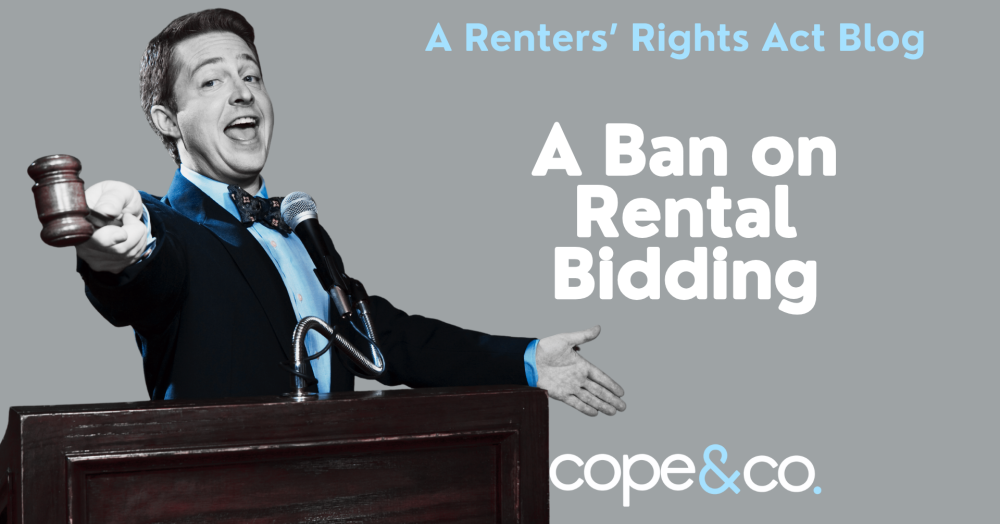
Rental Bidding and Discrimination: The New Rules
The days of bidding wars and “no DSS” ads are over. The Renters’ Rights Act bans landlords from inviting higher offers and outlaws blanket bans on applicants. From now on, every property must be clearly advertised at a single rent and every tenant judged fairly and equally. Here’s what it means for landlords...
The Renters’ Rights Act introduces new protections aimed at creating a fairer and more transparent rental market. Two of the most significant are the ban on rental bidding and new restrictions around discrimination in applicant selection. Together, these changes will reshape how landlords market properties and choose tenants.

🔵 The Current Market Practices
Firstly, lets highlight some of the things that currently happen in today’s market, especially in high-demand areas:
🔸 Some landlords or agents invite applicants to outbid one another above the advertised rent, driving the price up.
🔸 Others cherry-pick tenants based on criteria like income source (e.g. “no DSS”), family status, or willingness to pay more upfront.
🔸 While existing laws like the Equality Act already ban discrimination on protected characteristics (race, gender, disability, religion, etc.), enforcement has been patchy, and “softer” exclusions (e.g. “no pets,” “no children,” “no benefits”) have remained widespread.

🔵 What’s Changing Under the Act
The Renters’ Rights Act sets out clear new rules:
Ban on rental bidding
Landlords and agents must advertise a property with a single asking rent and cannot invite or encourage applicants to offer more. If a tenant voluntarily offers above the advertised rent, the landlord may accept it, but it cannot be solicited.
Standardised advertising
Every rental must show a clear, fixed rent figure. Multiple “bands” or “offers invited” language will no longer be permissible.
Ban on blanket exclusions
Landlords and agents will not be able to publish adverts with blanket bans such as “no children,” “no pets,” or “no DSS.” Applicants must be assessed fairly and individually.
Strengthened anti-discrimination enforcement
Councils and the Ombudsman will have powers to act against landlords or agents who discriminate unlawfully. Tenants will also have clearer routes to raise complaints.

🔵 What This Means for Landlords
These reforms mean big changes in how landlords market properties and process applications:
🔹 No competitive bidding - You can’t use demand to drive rent higher through offers. Your marketing must state one asking rent, and you must stick to it.
🔹 Increased transparency - Advertising and application processes will need to be clear and consistent.
🔹 Fairer applicant selection - Decisions must be based on objective criteria like affordability, references, and suitability - not blanket exclusions.
🔹 Risk of penalties - Breaching the new rules could bring enforcement action, fines, and reputational damage. Tenants will report you to the local authorities if they suspect any breaches.
🔹 Reduced flexibility - While you can still decline unsuitable tenants, you’ll need a justifiable reason (e.g. failed referencing) rather than broad-brush policies.

🔵 How Landlords Can Prepare
🔹 Review your advertising templates - Remove any blanket bans (e.g. “no pets,” “no children,” “no benefits”). Replace with clear rent figures and neutral, factual descriptions.
🔹 Set your rent fairly at the start - Do your market research and advertise at a realistic rent. Once published, you can’t invite higher offers.
🔹 Adopt fair applicant processes - Use standard referencing and affordability checks applied equally to all applicants. Document reasons for refusals in case you need to evidence them later.
🔹 Prepare for more applications - Without bans, you may receive a wider pool of applicants. Factor in more time for screening, and use consistent criteria to stay compliant.
🔹 Stay alert to enforcement - Councils and the Ombudsman will be actively monitoring adverts and practices. Getting it wrong could mean fines or tribunal action.

🔵 Final Word
The Renters’ Rights Act is closing the door on rental bidding wars and blanket discrimination. For landlords, the focus now must be on transparency, fairness, and compliance. By setting a realistic rent, advertising responsibly, and treating all applicants consistently, you’ll not only avoid penalties but also attract a broader pool of tenants, and build a reputation as a fair, professional landlord.
At Cope & Co., we’re here to make sure compliance never feels like a burden. From keeping your paperwork watertight to navigating the Renters’ Rights Act with confidence, our team can help you stay ahead and protect your income. Get in touch today to see how we can support you.

LetSimple is our unique, stress-free way to let us take care of everything. One monthly subscription, no hidden fees, and rent guarantee built in, so you can relax knowing your income is protected.
Click the image below to see how LetSimple gives landlords comfort, compliance, and complete peace of mind.











